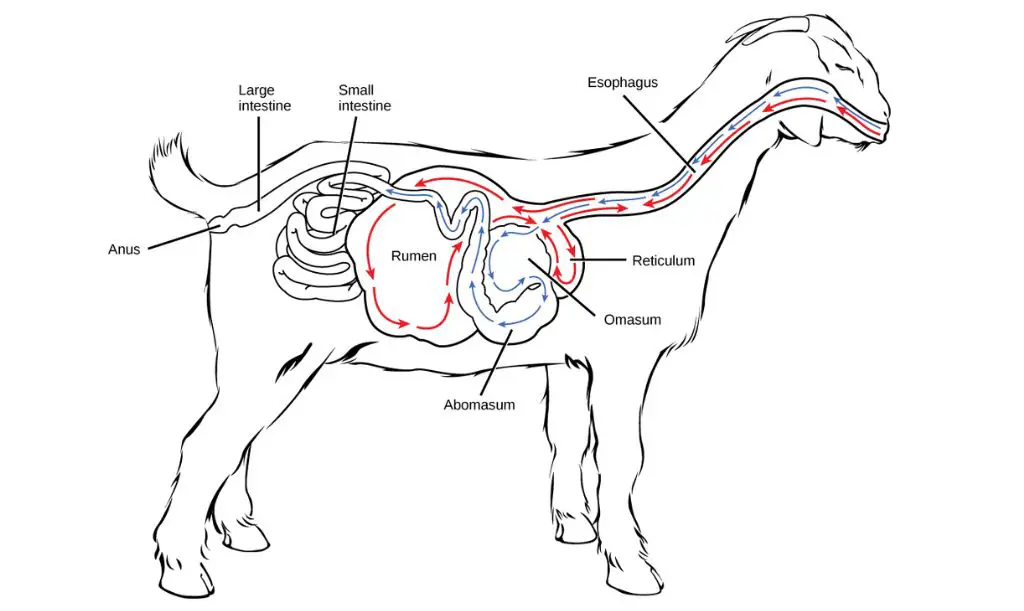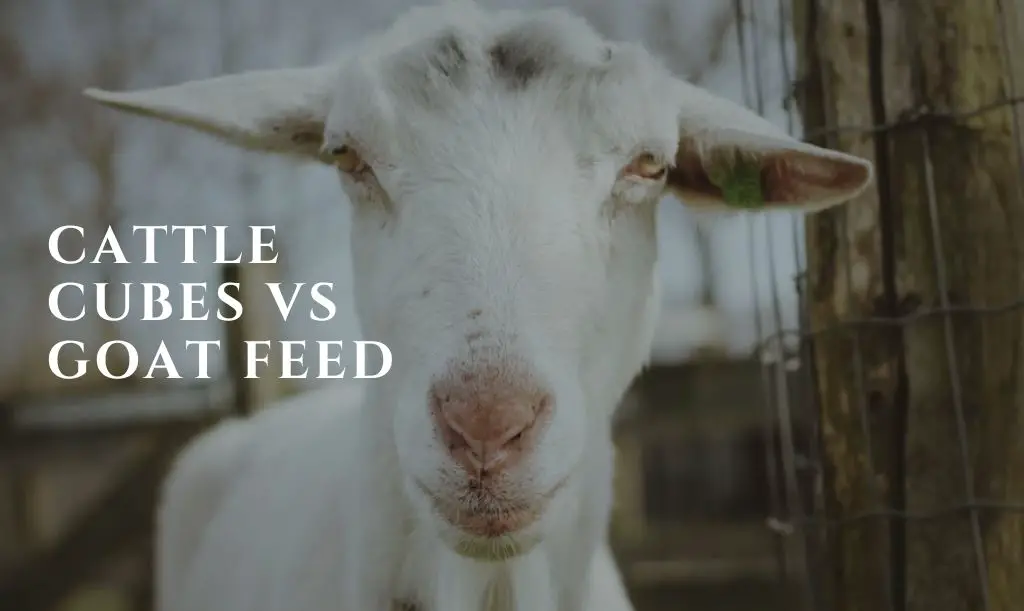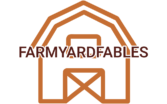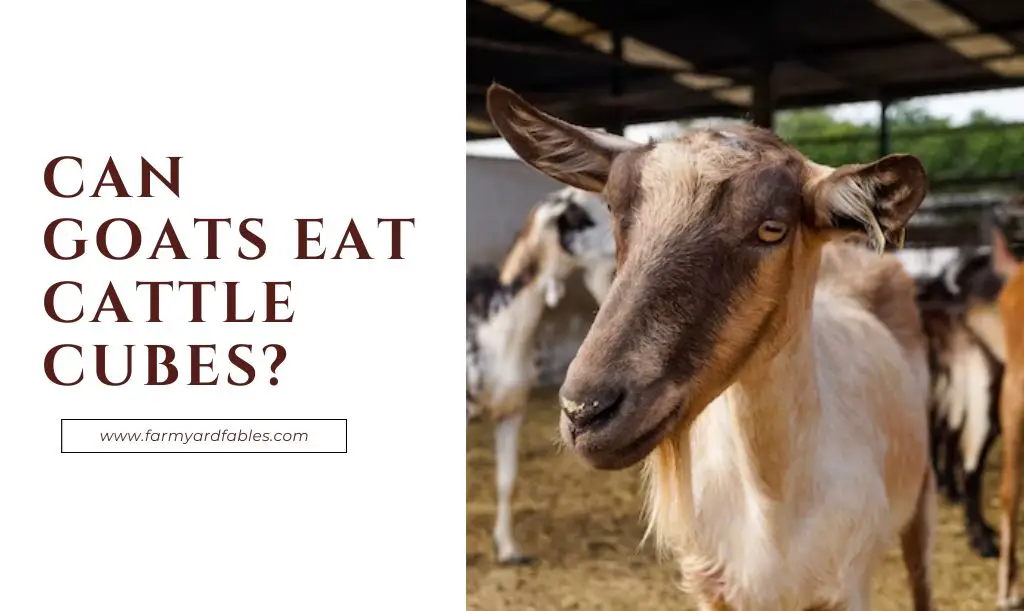When it comes to goats, their unique dietary habits have always piqued my curiosity.
These fascinating creatures have a reputation for being voracious eaters, munching on a wide variety of plants and vegetation.
From grasses to leaves and even shrubs, goats possess an uncanny ability to digest and extract nutrients from what many other animals would consider inedible.
However, amidst this intriguing world of goat feeding habits, a curious question arises: Can goats eat cattle cubes?
While goats can eat cattle cubes, it is not recommended as a primary food source. Cattle cubes are formulated specifically for the nutritional needs of cattle and may not provide a balanced diet for goats.
The mere thought of these cube-shaped feed supplements, primarily designed for cattle consumption, finding their way into the diet of your goats is indeed thought-provoking.
In this article, we will explore the subject in detail and shed light on whether or not it is safe and beneficial for goats to eat cattle cubes.
Can Goats Eat Cattle Cubes (Key Takeaways)
- Goats can eat cattle cubes, but they should only be given as an occasional treat or supplement.
- Cattle cubes are formulated specifically for the nutritional needs of cattle and may not provide a balanced diet for goats.
- It’s important to check the ingredients of the cattle cubes and ensure they do not contain any harmful additives or medications that may be unsafe for goats.
- Feeding excessive amounts of cattle cubes to goats can lead to nutritional imbalances and health issues.
- Goats primarily require a diet consisting of hay, forage, and grains formulated specifically for goats to meet their nutritional requirements.
- Consult with a veterinarian or animal nutritionist for specific dietary recommendations for goats to ensure their health and well-being.
What To Feed Goats
Here’s a comprehensive table showing what you can and cannot feed goats:
[table id=1 /]
Please note that not all plants that goats can’t eat are included in this list, and the same applies for plants they can eat. Also, the toxicity level of some plants can vary, and some are only harmful in large quantities or certain parts of the plant. Always consult with a vet or a goat expert if you are unsure about a particular plant or food.
Dietary Habits of Goats: Nature’s Grazers

Goats are natural-born grazers with incredible adaptability to various environments.
Their dietary preferences primarily consist of browsing on low-lying foliage such as shrubs, bushes, vines, and trees.
This behavior aligns with their evolutionary history as mountain climbers and explorers of diverse terrain.
In addition to their inclination towards browsing, goats also show interest in grazing on grasses if given the opportunity.
However, while they may nibble at grass occasionally or when other food sources are limited, it does not constitute a significant portion of their regular diet.
Instead, they tend to favor broadleaf plants with higher nutritional value.
Intriguing Question: Can Goats Eat Cattle Cubes?
At first, the idea of introducing cattle cubes into my goats’ diet seemed unusual or even unorthodox.
After all, cattle cubes are specifically formulated to meet the nutritional requirements of bovines, not goats.
However, it is essential to consider the underlying question: could there be potential benefits or drawbacks to incorporating cattle cubes into a goat’s feeding regimen?
Before we dive deep into investigating this matter, it is crucial to understand what cattle cubes are and how they differ from traditional goat feed.
By doing so, we can evaluate their compatibility with goats’ dietary needs and determine if they are a viable option for supplementing their nutritional intake.
Goats’ Dietary Needs
Goats are herbivores, which means they thrive on a plant-based menu. But what exactly do these ruminant eaters need to stay happy and healthy?
Well, let’s dig into the details of their nutritional requirements! First and foremost, goats require a diet that is rich in fiber.
These marvelous munchers have a unique digestive system that allows them to break down tough plant material efficiently.
Fiber is crucial for maintaining proper gut health and preventing issues like bloating or constipation.
In fact, goats should have access to high-quality forage, such as grasses or hay, at all times.
This provides them with the necessary roughage to promote healthy digestion.
Importance of a Balanced Diet for Optimal Health
Just like humans, goats also need a well-balanced diet for optimal health and vitality. A balanced diet ensures that goats receive all the essential nutrients they need to thrive.
So what exactly does this mean?
Protein is an important component in a goat’s diet as it supports growth, milk production (for lactating females), and overall muscle development.
Goats can obtain protein from various sources such as legumes (like alfalfa), grains, or even certain types of pasture plants.
Carbohydrates also play a significant role in providing energy for goats.
Grains like oats or barley are commonly included in goat feed mixes because they provide readily available energy.
Vitamins and minerals are vital for maintaining overall health and preventing deficiencies or imbalances.
Goats require specific vitamins like Vitamin A (important for vision) and Vitamin D (essential for calcium absorption).
Additionally, minerals like calcium, phosphorus, and selenium are crucial for strong bones, healthy teeth, and a properly functioning immune system.
To ensure goats receive all the necessary nutrients, their diet should be carefully planned and balanced. This can include a combination of forage, grains or concentrates, and supplementation when needed.
Providing a varied menu will not only keep our goats satisfied but also contribute to their overall well-being.
So now that we’ve explored the dietary needs of goats in detail, let’s move on to the intriguing question: Can goats eat cattle cubes?
Watch this:
What Exactly Are Cattle Cubes?
In a nutshell, cattle cubes are those little nuggets of goodness that you often see farmers dropping into the troughs for their cows to devour.
These cubes are essentially a concentrated form of feed that is carefully formulated to meet the specific nutritional needs of cattle.
They are composed of a variety of ingredients, including grains like corn, wheat, or barley, along with protein sources such as soybean meal or cottonseed meal.
To give them some extra oomph, manufacturers may also add in vitamins and minerals to ensure an adequate balance.
Now, here’s the interesting part: cattle cubes come in different flavors!
Well, not exactly flavors like ice cream or cookies (although that would be fascinating), but rather different formulations tailored for specific stages of a cow’s life.
You’ve got cubes designed for growing calves, cubes for beef cattle during their finishing phase before slaughter, and even cubes specially made for lactating cows.
Talk about catering to bovine dietary needs!
Purpose and Typical Usage in Livestock Feeding
Why on earth do farmers use these little cube wonders? Well, it all boils down to convenience and efficiency.
You see, when you have a herd of hungry beasts clamoring for their grub, it can be quite the time-consuming task to individually measure out each portion of feed.
But with cattle cubes on hand – voila! Farmers can simply toss these compact blocks into the feeding troughs without much fuss.
Moreover, cattle cubes are designed to provide an all-in-one solution when it comes to meeting the nutritional requirements of cows.
They serve as an excellent source of energy thanks to their grain content while also supplying vital proteins and essential nutrients necessary for healthy growth and development.
Additionally, these handy little bricks can help ensure consistent intake of nutrients among the herd, reducing the risk of some animals hogging all the goodies and others getting left with an empty stomach.
It’s like a buffet tailored for each cow’s needs, right in that little cube!
Can Goats Eat Cattle Cubes? (Potential Risks & Benefits)
When pondering whether goats can eat cattle cubes, it’s only natural to question the potential benefits. One advantage lies in the high protein content of cattle cubes.
Goats, being ruminants just like their bovine counterparts, require a good dose of protein for healthy growth and development.
By including cattle cubes in their diet, goats can enjoy an additional source of this essential nutrient.
Furthermore, cattle cubes are designed to provide a concentrated blend of nutrients that can enhance livestock performance.
This means that by incorporating these cubes into their diet, goats might experience improved weight gain and overall vigor.
Additionally, since goats often display selective eating habits and may not consume all types of pasture vegetation, offering them cattle cubes could serve as a supplement to ensure they receive a well-rounded nutritional intake.
Weighing the Drawbacks
While there are potential benefits to be had from introducing cattle cubes into goats’ dietary repertoire, it’s also crucial to consider the drawbacks before diving headfirst into this culinary adventure.
One primary concern is the risk of overfeeding or imbalance in nutrient intake.
Goats have specific dietary requirements that need careful consideration – excessive protein or minerals can lead to health issues such as urinary calculi or mineral toxicity.
Another point worth considering is that not all goats will like it. In my case, half my goats like it while the other half can’t stand it.
If your goats turn up their noses at the prospect of consuming cattle cubes, it may not be worth forcing them to do so unless there’s an underlying deficiency you’re trying to address.
The All-Important Factors
Before embarking on any dietary changes for your beloved goats, it’s essential to take a step back and consider several factors that can influence the feasibility of goats consuming cattle cubes.
First and foremost, one must evaluate the overall health and condition of the goats in question.
Are they in good health with no pre-existing dietary sensitivities or medical conditions that could be aggravated by the introduction of cattle cubes?
Additionally, it’s essential to assess the availability and affordability of cattle cubes in your region.
If they are readily accessible and economically viable, it may be worth exploring further.
However, if obtaining cattle cubes proves challenging or excessively costly, alternative feeding options should be considered.
Nutritional Analysis: Cattle Cubes vs Goat Feed

Next, let’s compare the nutritional content of cattle cubes vs goat feed.
Comparing Nutrient Content
When it comes to comparing the nutrient content of cattle cubes and goat feed, it’s like trying to decipher a complicated equation.
Each has its own unique blend of goodness that can either make a goat’s taste buds dance with delight or leave them feeling unsatisfied.
Let’s break it down, starting with the all-important protein.
Cattle cubes tend to have a higher protein content than most goat feeds, making them a potential muscle-building powerhouse for your caprine friends.
However, goats also require a good amount of fiber in their diet to maintain healthy digestion and prevent bloating.
This is where goat feed tends to shine, as it often contains more fiber compared to cattle cubes.
Vitamins and Minerals Galore
Now let’s turn our attention to the dazzling world of vitamins and minerals. Goats need a well-rounded assortment of these micronutrients for overall health and vitality.
While cattle cubes certainly pack a punch in terms of providing essential vitamins and minerals, they may not always meet the specific needs of goats.
Goat feeds are often formulated to cater specifically to their nutritional requirements, ensuring they receive an adequate dose of vitamin A for vision health or calcium for strong bones.
As we dive deeper into the carbohydrate realm, we find that cattle cubes tend to be relatively low in carbohydrates compared to some specialized goat feeds which provide an energy boost when those playful goaters are jumping around in the fields.
It’s essential not only for their daily frolicking but also for maintaining their body temperature during colder times.
Overall, there isn’t necessarily a clear winner here between cattle cubes and goat feed when it comes to nutrient content alone.
It ultimately depends on your goats’ individual needs and preferences as well as consulting with your veterinarian or animal nutritionist for expert advice.
Remember, a well-balanced diet is key to keeping your goats in tip-top shape.
Considerations for Safe Consumption
While cattle cubes can provide some nutritional value, it is essential to be aware of the potential risks involved in feeding them to goats.
One primary concern is the high protein content found in cattle cubes, which may exceed the necessary amount for goats. Excessive protein intake can strain the kidneys and lead to health issues.
Additionally, cattle cubes are formulated specifically for cows and may not have all the necessary nutrients that goats require.
This imbalance could result in deficiencies or imbalances in their diet, affecting their overall health and well-being.
Another risk associated with feeding cattle cubes to goats lies in their firm texture.
Goats have different chewing habits compared to cows, and they are more inclined towards browsing on roughage rather than consuming dense feedstuffs like cattle cubes.
The hardness of these cubes might pose a choking hazard or lead to digestive problems if not adequately broken down before ingestion.
It is crucial to evaluate these potential risks before incorporating cattle cubes into a goat’s diet.
Guidelines for introducing cattle cubes into goat’s diet safely
To ensure the safe consumption of cattle cubes by goats, it is vital to follow specific guidelines.
Firstly, consult with a veterinarian or animal nutritionist who specializes in goat nutrition before introducing any new feedstuff into their diet.
They can provide valuable insights tailored specifically to your goat’s needs.
When introducing cattle cubes into a goat’s diet, start slowly and gradually increase the amount over time as they become accustomed to it.
This allows their digestive system ample time to adjust without overwhelming them or causing any adverse effects.
To minimize potential choking hazards, consider crushing or breaking down the cattle cubes into smaller pieces that are easier for goats to chew and digest properly.
Mixing these smaller pieces with other feeds such as hay or grains can also help encourage proper chewing habits and facilitate effective digestion.
Alternative Feeding Options for Goats
While cattle cubes may not be the ideal feed option for goats, several alternative feeding options can fulfill their nutritional requirements more effectively.
One such alternative is high-quality goat feed specifically formulated for their dietary needs.
Goat feeds are designed to provide optimal levels of essential nutrients, including protein, fiber, vitamins, and minerals, necessary for goat health and well-being.
These feeds usually come in pellet or textured forms and are readily available in most feed stores.
Another excellent option for meeting goats’ nutritional needs is a diet consisting of good-quality hay or pasture.
Goats are natural browsers and thrive on consuming a variety of plant materials.
Providing them with access to clean pastures rich in diverse vegetation can offer a well-rounded diet that complements their natural grazing habits.
Supplementing their diet with small amounts of fresh fruits and vegetables can also be beneficial.
However, it’s crucial to ensure these additions are safe for consumption by goats and do not contain any toxic compounds that could harm them.
Can Goats Eat Cattle Cubes? Conclusion
That concludes this article on whether goats can eat cattle cubes.
While there may be potential risks associated with feeding cattle cubes to goats, following proper guidelines can help mitigate these concerns.
It is essential to consider the specific needs of goats when determining suitable feed options.
Consulting with experts in goat nutrition ensures that the dietary choices made align with their overall health requirements.
Fortunately, numerous alternative feeding options exist that cater specifically to goats’ nutritional needs.
Whether it’s high-quality goat feed formulated specifically for them or providing access to diverse pastures rich in vegetation alongside appropriate supplementation, there are plenty of ways to provide a balanced diet that will keep our goat companions healthy and thriving.
By being mindful of their dietary needs and making informed choices about the types of feed we offer them, we can ensure that our goats lead happy, healthy lives.
Related Articles:
- https://farmyardfables.com/is-peanut-hay-good-for-goats/
- https://farmyardfables.com/can-goats-eat-too-much-hay/
- Do Goats Sound Like Humans? Find Out Here! - 22 December 2023
- Vegetable Oil For Constipated Goat (Comprehensive Guide) - 22 December 2023
- Is Bermuda Hay Good For Goats? (Solved!) - 21 December 2023


